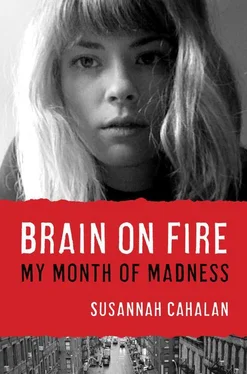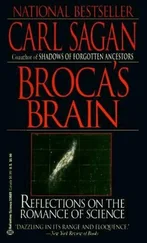“You were just out of your mind,” she said. “Do you remember when you had your EEG done?”
EEG? “No, I don’t.” But after some rehashing, I did remember something: the nurse at Dr. Bailey’s office with her strobe light. Unlike the unnerving scene in the hospital video, when my experience of those moments was likely never encoded in my brain at all, this memory had been made and stored. The problem was retrieving it. When the brain is working to remember something, similar patterns of neurons fire as they did during the perception of the original event. These networks are linked, and each time we revisit them, they become stronger and more associated. But they need the proper retrieval cues—words, smells, images—for them to be brought back as memories.
Watching me struggle to remember this, my mom’s face flushed, and her lower lip quivered. She buried her face in her hands; it was the first time I had seen her cry since long before I was sick.
“I’m better now, Mom. Don’t cry.”
“I know, I know. I’m being silly,” she said. “Oh, and you were totally nuts. You walked into a restaurant and demanded food. Just demanded it. Although I guess that’s not too far outside your normal personality.”
We laughed. Just for a brief moment, I could picture the rows of booths in the diner and a blurry man behind the countertop handing me coffee. This recovered image taunted me with the echoes of all the other moments I had forgotten and would never get back. And then it was gone.
More than just the recovery of a memory, though, this was the turning point when my mom finally conceded how afraid she had been, revealing through her tears that she hadn’t always been certain that I would be “fine.” And with that simple, natural gesture, our relationship rounded a corner. She once again became my ultimate confidante, companion, and supporter. It took accepting how close I had come to death (something impossible before, because it was her survival mechanism to deny) to finally allow us to move forward together.
Four months after my initial hospital stay, the lease to my Hell’s Kitchen apartment expired. My disability payments, which had been cut in half once they changed from short to long term, could no longer cover the rental expense, so my father met me there one morning to pack up my old life and clear the way for a new, uncertain one.
The red brick tenement was the same as it had always been, with its broken buzzer, stray marks of graffiti, and the “No Trespassing” sign on the door. Piles of unopened mail cluttered my mailbox. The building’s superintendent, a chubby, middle-aged man with a thick Spanish accent, walked by us with a short, “How ya doin’?” as if I had never left. Maybe he genuinely hadn’t noticed. My father and I climbed the stairs, past the chipping, gray-yellow wallpaper. It was all so familiar that when we made it to my apartment, I half-expected Dusty to still be there waiting for me, even though my friend Ginger had been fostering her for months.
My father and I packed up piles of records, bins of winter clothes, books, pots and pans, and bedding. Halfway through our cleanup, the air conditioner went kaput, which was more than we could bear in Manhattan’s blast-furnace July heat. So we returned the next day in the sweltering heat to finally finish the place off.
There is only one line about packing up the apartment in my journal, and it’s fairly flippant, like most of my early diary entries: “He helped me pack up my apartment (good-bye living alone).” In this short line, I don’t betray the disappointment I felt about having to not only officially abandon my self-sufficient life, but also give up my first real apartment, the symbol of my forgone adulthood. It was one thing to live at my parents’ house for a few months, knowing that I had my own place just a train ride away. Now my only home was with my mom; it was like a complete return to childhood. My life of freedom in Manhattan was officially over, at least for now.
The reality was that I was no longer capable of living on my own. It was a fact that I understood but still didn’t want to face. Instead I focused on getting my future in order. I began keeping to-do lists with names of people I wanted to thank, projects I wanted to start, or articles I someday wanted to write. Every morning I planned out my day, including insignificant things like “walk to town” or “read the papers,” so I could experience the satisfaction of crossing them off. These were crucial little details, because they showed that the frontal lobe, the “CEO,” was starting to repair itself.
Instead of attending the cognitive rehab sessions my doctor had recommended, I studied for the Graduate Record Exam, believing for a period of time that school might be the next step in my murky destiny. I bought several study guides to help me prepare, putting every word I didn’t know on a flash card, going through them, and then writing down the ones I could not remember. That took up pages and pages of my diary, because I could no longer commit new words to memory as well as I used to.
I also began to read David Foster Wallace’s thousand-page dystopian novel Infinite Jest, because a pompous professor had once been horrified that I hadn’t read it yet. With a dictionary in hand, I read through the novel, stopping every other word or so to find a definition. I kept a running file of all the words that I needed to define from the book. The words I picked are obtuse to me even now, but they are also strangely illuminating:
effete (adj): no longer fertile; having lost character, strength, vitality; marked by weakness or decadence
Teratogenic (adj): of, relating to, or causing developmental malformations
Lazarette (noun): sick room
Despite this studious attention to vocabulary, when people asked me what the book was about I’d have to confess, “I have no idea.”
I became preoccupied with my physical state. My diary entries around this time reflect a growing obsession with how much weight I had gained. My distended stomach, cellulite-covered thighs, and bloated cheeks disgusted me, and I tried in vain to avoid my image in any reflective surfaces. Often I would sit outside Starbucks and take stock of the many different types of women walking by: “I’d take her thighs,” or “I’d trade bodies with her,” or “I wish I had her arms.”
I described myself as a “roasted pig,” revolted by how my body and face seemed swollen. “Gross,” I wrote on June 16. “I make myself sick.”
Sure, I had gained a lot of weight since leaving the hospital, where I weighed in at an unnaturally skinny (for me) 110 pounds. Just three months later, I had put on 50 pounds, 20 of which were normal recovery weight and 30 of which were due to side effects of the steroids and antipsychotics, as well as my sedentary lifestyle and constant indulgence in mint chocolate chip ice cream. The steroids also made my face moon-shaped and chipmunk-like, to the point where I hardly recognized myself in the mirror. I had begun to fear that I would never lose the weight and would be forever confined to this foreign body. The problem was much more superficial—but easier to grapple with—than my real worries about being trapped in my broken mind. I know now that I focused on my body because I didn’t want to face the cognitive issues, which were much more complex and upsetting than mere numbers on a scale. When I worried about being fat forever, marred in the eyes of those closest to me, I was actually worried about who I was going to be: Will I be as slow, dour, unfunny, and stupid as I now felt for the rest of my life? Will I ever again regain that spark that defines who I am?
Читать дальше













